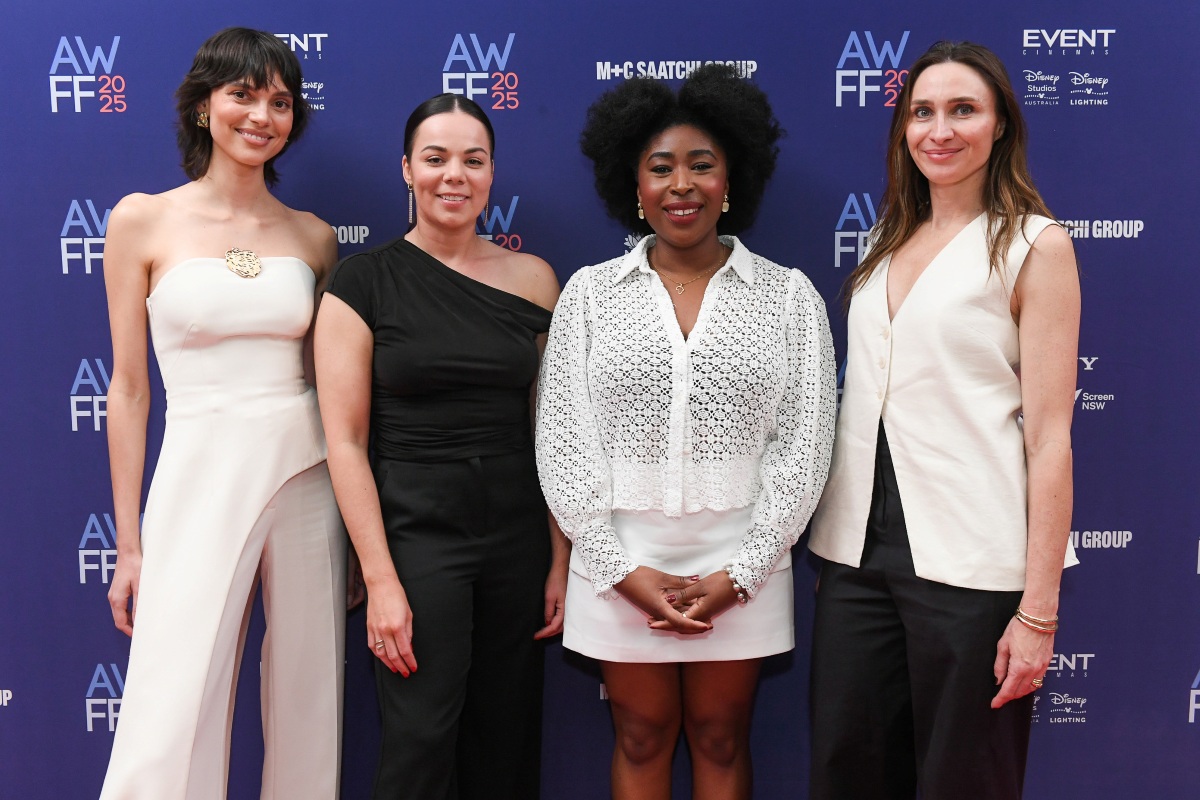by FilmInk Staff
Proudly supported by M+C Saatchi Group, the 2025 Australian Women’s Film Festival (AWFF) lit up Sydney last night with a celebration of female talent both in front of and behind the camera. The sold out event was made all the more special as guests celebrated AWFF’s fifth year honouring trailblazing women for their roles in redefining the film industry and breaking barriers for future generations.
Five years on, AWFF continues to provide a platform for female storytellers and leaders, empowering them to showcase their creativity and impact in a historically male-dominated industry. AWFF Co-founders Kelly Tomasich and Tahyna MacManus expressed their pride in seeing the initiative celebrate its five year milestone: “We’re so proud of the community that has grown around AWFF, a community of storytellers, visionaries, and trailblazers. This milestone belongs to all of them. It’s their passion and perseverance that continue to drive this festival forward and inspire the next generation of women in film.”
Hosted by Australian actor Chika Ikogwe (known for her roles in Heartbreak High and Land of Bad), the night saw an esteemed panel of judges including CAMILLA MAZZAFERRO (Producer, Academy Award–nominated Porcelain War; Girls Can’t Surf), CHARLEE FRASER (Actor, FURIOSA: A Mad Max Saga; Anyone But You), LANA GREENHALGH, (Head of Scripted Originals at Foxtel Group) and LOUISE GOUGH (Director of Narrative Content at Screen Australia), recognising the exceptional contributions of women in film.
A highlight of the evening was honouring acclaimed cinematographer MANDY WALKER with the AWFF Trailblazer Award. Additionally, NADINE BATES & KRISTEN SOUVLIS (Co-founders of Like a Photon Creative) were bestowed with the AWFF Groundbreaker Award for their contribution to animation.
The Australian Women’s Film Festival Award Winners included:
- BEST COMEDIC FILM – Not Russian Anywhere – Directed by Aimée-Lee Xu Hsien
- BEST DOCUMENTARY FILM – The Oldest Heart – Directed by Jessica Sherlock
- BEST ANIMATED FILM – Red Moon – Directed by Katherine Yuan
- BEST DRAMATIC FILM – Bear – Directed by Rebecca Paker
- BEST CINEMATOGRAPHY – Maggie Makes a Cherry Pie
- BEST SCREENPLAY – Maggie Makes a Cherry Pie
- BEST ACTOR – Tessa Rose – Bear
- BEST DIRECTOR – Rebecca Parker – Bear
- JUDGES ONE TO WATCH AWARD – Katherine Yuan – Red Moon
- M+C Saatchi Group Audience Choice Award, to Define Pretty.
The major award for BEST FILM went to dramatic film Maggie Makes a Cherry Pie directed by Maggie Grammatopoulos, who was absolutely thrilled to receive the honour along with a SONY ILME-FX6 Cinema Line camera, a $10,000 equipment rental package from VA Hire, a $10,000 rental package from Disney Lighting, and a $5,000 post-production package from Spectrum Films.
Reflecting on this year’s impressive submissions, AWFF Co-founders Kelly Tomasich and Tahyna MacManus remarked: “Each year, we’re blown away by the depth, originality, and heart in the submissions and this year was no exception. The talent and vision of these filmmakers continue to raise the bar and reaffirm why this platform matters.”
The Australian Women’s Film Festival 2025 not only celebrated achievements but also reinforced the importance of continuing to elevate women’s voices in the film industry, ensuring a more inclusive and representative future for all.
M+C Saatchi Group were proud sponsors of AWFF for the fifth year in a row, also supported by Screen NSW, Sony, Event Cinemas, Disney Studios Australia, and Amazon Web Services.
For more information, visit: https://awff.com.au
Australian Women’s Film Festival conditions of entry include:
- At least three of the film’s key creatives (e.g. Writer, Director, Producer, DOP, Animator, Composer, Editor) must identify as female. This is designed to encourage the inclusion of women in an industry traditionally dominated by males. Men are not excluded from entering AWFF, but they must be willing to work in collaboration with women; and
- Fictional films must also pass the Bechdel test; a measure of the representation of women in fiction. It asks whether a work features at least two women who have a conversation about something other than a man.




